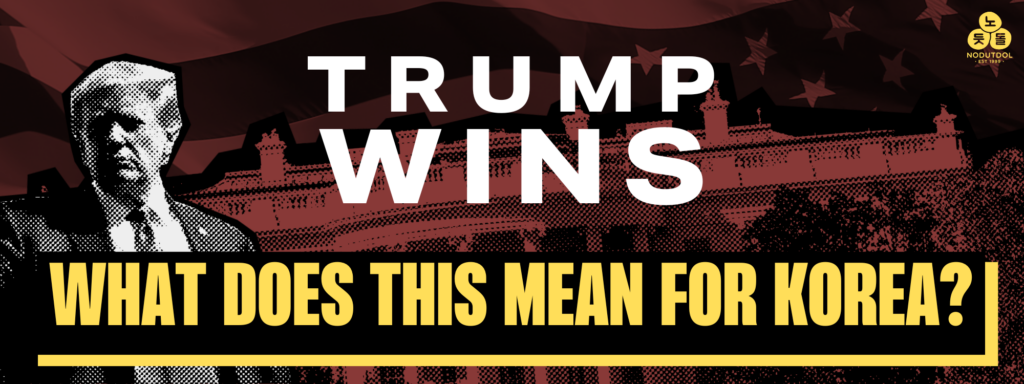
Relations between the Republic of Korea (ROK) and the Democratic People’s Republic of Korea (DPRK) are at their most volatile in decades. US-ROK war threats have reached unprecedented levels of frequency and recklessness, and the military situation is rapidly escalating to a point of no return. This outcome is entirely the result of the past four years of US policy under a Biden presidency, which accelerated the decline of inter-Korean relations—upholding the worst of Trump’s policies while introducing new destabilizing factors.
Under Biden, Washington engineered a new war alliance between the US, Japan, and the ROK (JAKUS) with the aim of coordinating military aggression against the DPRK. The number of US-ROK military exercises has significantly increased, with hundreds of days of war games conducted in Korea annually. This summer, these exercises included rehearsing plans for a nuclear strike on the Korean peninsula.
So what does a return to a Republican presidency under Donald Trump mean for Korea?
While some may believe Trump could put a stop to the growing risk of war on the peninsula, we reject this as an ahistorical and misinformed position.
In 2017, President Trump threatened to “totally destroy” Korea with “fire and fury”, and imposed the most punishing sanctions regime against the DPRK that our people have ever faced. Under Trump, three quarters of the DPRK’s export industries were targeted by US and UN Security Council sanctions. These sanctions are estimated to have killed thousands of people in the DPRK—primarily children and pregnant women. It was the Trump administration that imposed travel bans against the DPRK, barring US passport holders – including Koreans with family in the DPRK – from traveling there.
Between 2018 and 2019, any steps towards normalizing relations between the US and the DPRK failed due to the Trump administration’s refusal to make key concessions or engage in genuine diplomacy. The 2019 North Korea–United States summit in Hanoi ended within minutes when the Trump administration flatly rejected Pyongyang’s request for partial relief from Washington’s murderous sanctions. Although Trump had another chance to revive talks after meeting with Kim Jong Un at the DMZ months later, his administration instead participated in a simulation of a US-ROK occupation of the DPRK.
Despite the fruitless nature of these talks, the media and the Democrats used them as an opportunity to liken Trump to Kim, romanticize their relationship, and reduce the idea of normalizing relations with the DPRK to something only a wildcard like Trump could pursue. Not only did this demonize diplomacy with the DPRK but this allowed Trump to position himself as an asset to peace in Korea and whitewash his imperialist record against the Korean people—as well as his aggressive ambitions for the coming four years.
Like Biden before him, the incoming Trump administration will likely escalate the New Cold War on China, which has divided East Asia into opposing military blocs that grate against each other in Korea. To uphold this strategy, the Trump administration will maintain Korea as property of the US military and support the far-right Yoon Seok Yeol regime of the ROK. Decried within the ROK as a dictator in the making, the Yoon government has faithfully served as a US proxy—antagonizing the DPRK as well as labor and progressive movements within the ROK. The Yoon regime is pushing for war against the DPRK, and has done so with the full political and military support of the US. In the wake of these escalations, the DPRK has broken with more than half a century of standing policy of pursuing peaceful reunification and declared the ROK as its “principal enemy.” This is a paradigmatic shift in Korea, because it means that the possibility of a peaceful political resolution to the division of Korea has ended for the time being.
The US is creating conditions for a new war in our homeland. This summer, we launched the US Out of Korea campaign, putting forward four key demands to uproot US imperialism in Korea:
- We demand the full and permanent withdrawal of US troops and weapons systems from Korea. We demand all Korean land, water, and airspace appropriated for the US military be returned to the Korean people.
- We demand an end to all US-South Korea alliances, including the JAKUS trilateral security cooperation. We demand an end to all US-South Korea joint command structures—the Combined Forces Command, and the UN Command.
- We demand an end to all US military exercises in Korea. We demand all sanctions against North Korea be lifted.
- We demand the US government divert spending from war, prisons, and policing. We demand housing, education, healthcare, and climate justice for working people.
As Koreans in the US, we owe it to the people of both Korea and the US to take action against the drive for imperialist war. As an organization, we do not place our faith in the ruling class or its politicians. The liberation of Korea from imperialism will not be brought about by the imperialists themselves. We know that the people will have the final say, and so our work to build a mass movement against US imperialism in Korea and everywhere continues.
